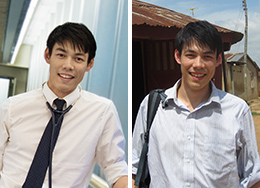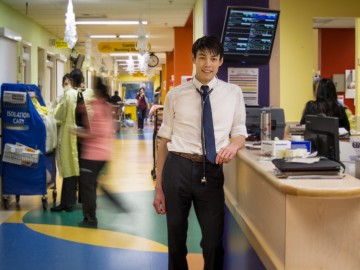Like his fellow pediatrics residents at BC Children’s Hospital, Kristopher Kang is consumed with the challenges of a medical trainee — tending to patients, learning treatment protocols, conducting research, navigating the bureaucracy.

Kristopher Kang in the corridors of BC Children’s Hospital, and in a neighborhood outside Abuja, Nigeria.
And then, when he gets the rare chance to take a break from it all, he immerses himself in a completely different set of challenges — gunfire and bombs, subsistence poverty, rudimentary governance.
Dr. Kang works as a United Nations consultant in some of the poorest or most violent corners of the world. As far removed as those two occupations may be, they share a common goal — caring for children.
As a consultant, he has become an expert on two aspects of child protection in low-income countries: expanding birth registration, so that more children can get access to schooling and health care, and finding alternative care for children who have lost their parents or have been separated from their families.
Dr. Kang, 29, has become one of the U.N.’s go-to analysts on both issues, valued for his ability to quickly find the right people to interview, and distill what he learns into practical reports – and most important, advice – for government officials.
“I’m told, ‘Fix this’ or ‘Figure this out,’” Dr. Kang explains. “They say, ‘You can meet with anybody you want, we’ll take you wherever you want to go, you have this many days. Let’s make a plan.’ Then we negotiate on deliverables.”
Dr. Kang, a native of Kamloops, discovered his knack for fact- finding and analysis on behalf of children soon after graduating from Princeton University — first as a research assistant at Columbia University, and then working for a child advocacy group at UNICEF’s New York headquarters.
A year later, in 2007, the U.N. sent him to Nepal to develop “how-to” documents for South Asian politicians and policy- makers interested in tackling child protection issues, including care for parentless children and supporting those affected by HIV and AIDS.
In the midst of that assignment, he was sent to Afghanistan to get a handle on that country’s large number of institutionalized children, and to help craft a strategy for returning those children to relatives. He returned to Afghanistan in 2008, working directly for the Afghan government on that same issue.
 “There were guns everywhere,” he says. “We always rode in a U.N.-marked car. There were often gunshots at night. Sometimes, there were big explosions, and we wouldn’t be able to go to work the next day.”
“There were guns everywhere,” he says. “We always rode in a U.N.-marked car. There were often gunshots at night. Sometimes, there were big explosions, and we wouldn’t be able to go to work the next day.”
He took a break from his consulting work as a UBC medical student, but returned to it in 2011 as a first-year resident, when the U.N. hired him to conduct a bottleneck analysis of the birth registration system in Nigeria, where 70 per cent of children under 5 years old – about 18 million – are not registered.
“We ended up with a massive amount of data about what was going on,” Dr. Kang says. “We were able to map out where the major barriers were, prioritize them, and propose interventions to improve coverage and monitoring.”
Still, most of Dr. Kang’s time is focused on pediatrics, where he is developing a focus on pediatric cardiology, due in large part to the mentorship of Associate Professor Shubhayan Sanatani.
“His work ethic is phenomenal,” Dr. Sanatani says. “He pushes himself very hard. And at the same time, he is one of the most humble residents in the program.”